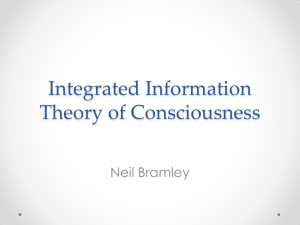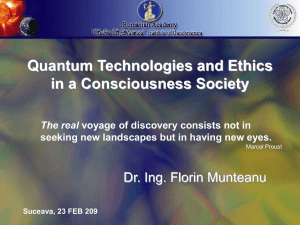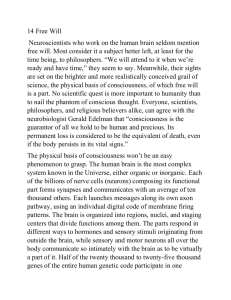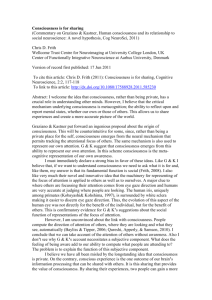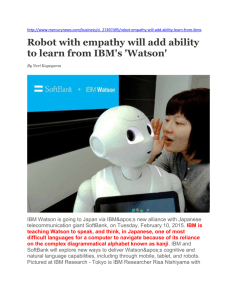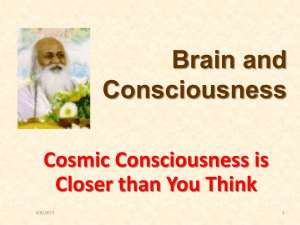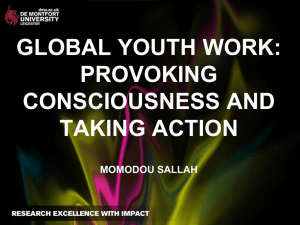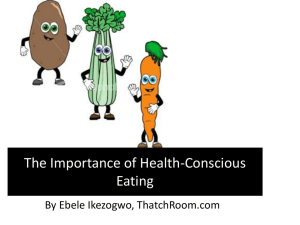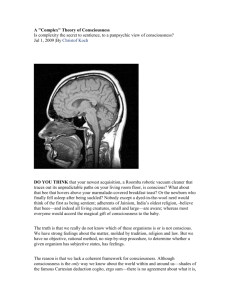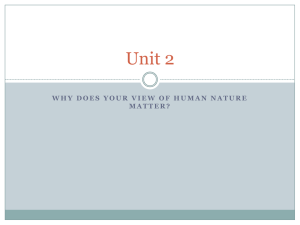PNEI NEWS
advertisement
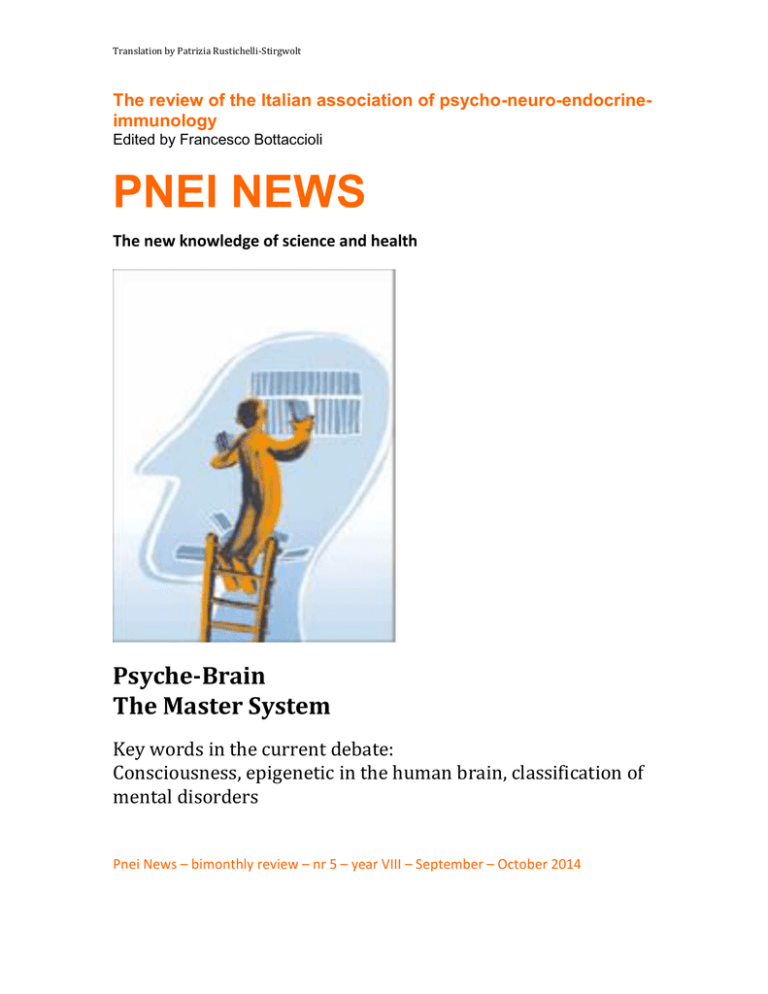
Translation by Patrizia Rustichelli-Stirgwolt The review of the Italian association of psycho-neuro-endocrineimmunology Edited by Francesco Bottaccioli PNEI NEWS The new knowledge of science and health Psyche-Brain The Master System Key words in the current debate: Consciousness, epigenetic in the human brain, classification of mental disorders Pnei News – bimonthly review – nr 5 – year VIII – September – October 2014 Translation by Patrizia Rustichelli-Stirgwolt PNEI NEWS NR 5 – September –October 2014 EDITORIAL Page 3. Psyche-Brain The Human Health Master System Francesco Bottaccioli Consciousness as integration of information Page 4. Interview with the neurophysiologist Marcello Massimini From Edelman and Tononi’s theory of consciousness seen as a process of integrated information generated by the thalamocortical system, to the measurement of consciousness. The results are surprising even in a clinical context where consciousness is normally assumed to be at its minimum. Paola Emilia Cicerone Psyche-Brain - Epigenetics Page 7. Neurodegenerative diseases. Will an epigenetic therapy be possible? Epigenetic medication is being tested on animals and the results are very encouraging. It is still too early to be too optimistic, yet these positive results indicate that, in the treatment of neurodegenerative diseases, epigenetic therapy shows very promising potentialities. Fabio Coppedè Psyche-Brain - Psychiatry Page 11. The new DSM-5: when thresholds are too low. The Diagnostic and Statistical Manual of Mental Disorders (DSM) is a very influential text affecting deeply the psychiatry world. The fifth edition has lowered the thresholds of many diagnoses with the risk of increasing the number of “fake positives”. Paolo Migone Veterinary Medicine Page 19. A new medicine also for the other animals. Also pets suffer more and more from early onset chronic diseases. In her interesting book, Jutta Ziegler explains how a change of paradigm is necessary in veterinary medicine as well. Jutta Ziegler. Translation by Patrizia Rustichelli-Stirgwolt EDITORIAL Psyche and Brain – The Human Health Master System Francesco Bottaccioli - Master Director of “PNEI and Science of Integrative Care”, University of Aquila In his last book1, the French cognitive neuroscientist, Stanislas Deahene, reports how the study of consciousness was a taboo topic for decades both at the University and at the laboratory as it was considered “ill-defined, unnecessary, and passé”. According to Deahene, everything changed in the late 1980s, when the study of consciousness and subjectivity became progressively an exciting field of investigation in the “normal” neuroscience research. In effect there are researchers such as Deahene himself, Giulio Tononi and Marcello Massimini 2 (see interview in this issue) that did not hesitate to investigate the field of human subjective perspective. Yet there are scientists and cognitive philosophers who are still thinking of human subjectivity as a mere reflex of cerebral activity. According to a thesis recently reaffirmed by Patricia Churchland3, our brain is a genetically preprogrammed machine provided with devices that control our physiological, vegetative and behavioural activities. We are not actually the master of ourselves, we think we are because something in our head gives us the illusion that we decide what in reality has already been decided by our brain. Other philosophers draw general conclusions related to the “self” defined as a field of effects produced by the brain” or “the result of processing information generated in the biochemical events of the brain: it is a fragile subjectivity built as a ex-post narration, a false and a façade one, “the façade of the computational subconscious” 4. This is a vision of the human being whose lack is (to quote Eric Kandel) to trivialize both brain and mind. There are actually growing evidences that the psyche-brain relationship is so intertwined and mutually influential to depict a real system where a component has a vital need of the other one. Without a good psychology of the states of consciousness, writes Kandel, we can not progress in biology and vice versa. The oncologist and immunologist at UCLA, Steven W. Cole has recently enriched our knowledge by mapping the inflammatory gene transcripts scheme which is activated in the immune cells by the psychological perception of stressors: social isolation, fear, chronic stress, grief etc6. This biological inflammatory “engram” (that can also have an epigenetic signature) can become persistent and self-sustaining through thoughts, emotions, behaviours and thus shift from being a transitory phenomenon to a structured disorder. In this regard, Freud and Selye taught us that the borderline between a condition of health or disease lies on the individual perception of oneself. One of the main pathogenic psychological states is perceiving oneself as ill or being classified as such. For this reason, as stated in Paolo Migone’s analysis (see page 11), it is dangerous to expand the criteria for psychiatric diagnosis. The new edition of the Diagnostic and Statistical Manual for Mental Disorder (DSMV) runs in fact the risk to produce “false positives” namely classifying as ill individuals who are not ill. Translation by Patrizia Rustichelli-Stirgwolt 1. Dehaene S. (2014) Consciousness and the Brain. Deciphering How the Brain Codes Our Thoughts. Viking Adult 2. Massimini M., Tononi G (2013) Nulla di più grande. Dalla veglia al sonno, dal coma al sogno. Il segreto della coscienza e la sua misura, Milano, Baldini&Castoldi. See also Tononi ‘s PHI. Un viaggio dal cervello all’anima, Torino, Codice 2014 3. Churchland P. (2013) Touching a nerve: Our brains, Our Selves. Norton & Company 4. Marraffa M. & Paternoster A. (2013). Sentirsi esistere. Inconscio, coscienza, autocoscienza, Bari, Laterza. 5. Kandel E. (2013). The new science of mind and the future of knowledge. Neuron, 80, 3: 546560. DOI: 10.1016/j.neuron.2013.10.039. 6. Cole SW (2014) Human Social Genomics, PLOS 10; e1004601


